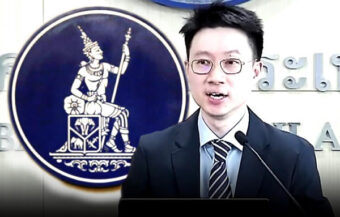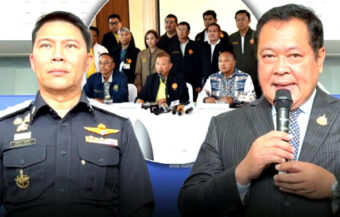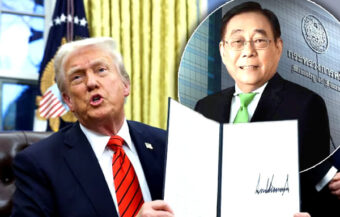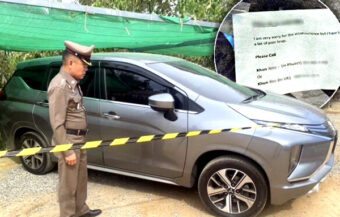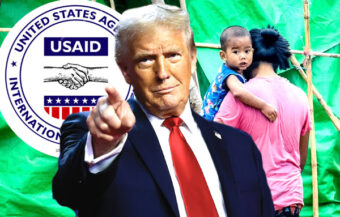MP calls for urgent review of Thai-Chinese visa deal after controversial signs. A government MP demands a review of security over the Thai-Chinese visa waiver scheme following Chinese billboards in Bangkok and Prachin Buri. The signs, advertising jobs and passports are seen as a threat to Thai workers and businesses. In short, part of a wider movement undermining the genuine Thai economy.
A government party MP on Wednesday called for the Ministry of Interior and other agencies to urgently review the situation linked to the permanent visa agreement with China. It follows a controversial Chinese billboard found in Huai Khwang on Monday. In turn, this was followed by the discovery of a second sign in Eastern Prachin Buri province advertising for migrant workers in the Chinese language. On Wednesday, Mr. Akkaradech Wongpitakroj, the House chair of its Industry panel, warned that easy access to Thailand from China is threatening Thai workers and their livelihoods.
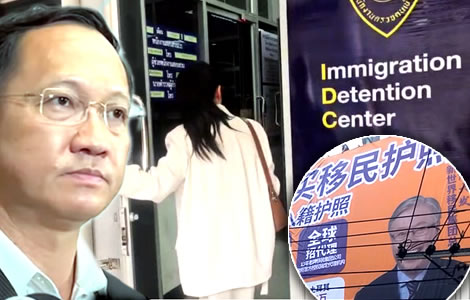
A United Thai Nation (Ruam Thai Sang Chart) Party MP has called for the government to review its visa waiver agreement with China. Akkaradech Wongpitakroj, a Ratchaburi MP who chairs the House of Representatives Industry Committee, made the call on Wednesday.
It comes following a scandal over Chinese-worded advertisements which appeared in Bangkok’s Huai Khwang on Monday.
The signs advertised passports and citizenship for four countries outside Thailand aimed at Chinese nationals locally.
Controversy over Chinese language roadside sign in Prachin Buri highlights illegal advertisement problem
Furthermore, another controversy has erupted over a roadside sign in Prachin Buri, also entirely in Chinese characters. In brief, this is a sign advertising jobs for migrant workers in factories in the eastern province.
Prachin Buri in particular is adjacent to the Eastern Economic Corridor (EEC) provinces of Chachoengsao, Chonburi, and Rayong.
Chinese billboard aimed at grey area operators causes outrage and prompts PM to visit local police station
Questions asked about the Thai Chinese visa waiver scheme ahead of high profile visit to Beijing to sign the deal
On Wednesday Mr. Akkaradech suggested that the permanent visa agreement between Thailand and China was presently a threat to Thai workers.
‘The Thai-Chinese visa-free agreement has a significant impact on Thai workers and businesses. Chinese are taking jobs away from Thais, especially in professions that are prohibited under labour law. I urge the Ministry of Home Affairs and the Ministry of Labor to address this problem immediately,’ he explained.
MP Chaichana Detdecho’s calls for action reflect rising concerns over grey Chinese capital in Thailand
Certainly, his calls were similar to those of Nakhon Si Thammarat MP Chaichana Detdecho. Mr. Chaichana is a Democrat Party representative and Chairman of the House Police Service Commission.
He insisted that deeper police investigation into the Chinese passports sign was required. The MP held that it showed that Thailand has a severe problem with grey Chinese capital infiltrating the kingdom.
In particular, he expressed concerns at the buildup of criminal groups centred in the Huai Khwang of Bangkok.
“In addition to illegal businesses across the country, grey Chinese investment groups have occupied various areas to demonstrate their influence, especially in Huai Khwang district, which is becoming a base for these groups. The display of passport and citizenship changes in several countries is alarming and shows that Thailand is a hub for these illegal activities,” he declared.
Minister of Labour and Deputy Prime Minister Anutin Charnvirakul respond to Chinese signs controversy
Meanwhile, a spokesman for the Minister of Labour, Mr. Phumipat Mueanchan, addressed the last sign discovered in Prachin Buri. In short, it was located near a main industrial estate on Road 304 at the Rojana Industrial Estate.
The senior official told reporters that the discovery had prompted a wider search for such signs. He said the matter had been taken up, particularly by Deputy Prime Minister Anutin Charnvirakul.
Phiphat Ratchakitprakarn, the Minister of Labour, has ordered an investigation into the ownership of the sign. In particular, whether it was placed by a foreign or Thai entity.
In turn, the Minister of the Interior Mr. Anutin told reporters that foreigners who use Thailand to break the law will be rooted out. However, he distinguished between those and foreign businessmen who adhered to Thai law. The latter group were certainly welcome.
Government intensifies efforts to regulate and control illegal migrant workers in Thailand
In the meantime, the senior official at the Ministry, Mr. Phumipat, assured the public that action was being taken.
“The Minister of Labor has a policy to seriously catch, arrest, fine, and push back illegal migrant workers. In brief, together with security agencies for 4 consecutive months since June. Recently, 10,504 establishments that employ migrant workers nationwide have been inspected. 889 illegal workers have been prosecuted. Soon, there will be another announcement to register migrant workers. So that everyone can enter the legal process properly. This will make it easier for the government to control their collect taxes. In addition, to take care of their quality of life according to universal humanitarian principles,” he told reporters.
Meanwhile, the investigations into the controversial sign in Huai Khwang continue. The local district chief Mr. Paitoon Ngammook explained that the building owner was fined ฿5,000 for the erection of the sign. The sign was found to have been placed illegally under the Building Control Act 1979 as amended.
Furthermore, he was the subject of a bill for ฿84,000 or half a year’s tax on the sign even though it had only been up for two days.
The local officials suggested that the sign was placed by a Singaporean company.
Police inquiries focus on Chinese woman linked to illegal signage and mobile Chinese capital across the World
At the same time, police inquiries into the sign are being directed by Metropolitan Police Bureau Chief Police Lieutenant General Thiti Saengsawang and Immigration Bureau Chief Police Lieutenant General Itthiphon Ittisarnronnachai, focusing on a 35-year-old Chinese woman.
Ms. Nazu was ordered detained for questioning on Tuesday by Immigration Bureau boss Police Lieutenant General Itthiphon.
In truth, she offered police investigators very little. Firstly, she claimed that the order for the sign came from a Hong Kong-based company. However, she could not name the company nor the officer that she dealt with.
She spoke to investigators of contact through social media accounts, in particular a Chinese application and later on the LINE application.
In brief, she said that the man whose picture was on the sign with the Chinese passport was who she was speaking with.
Detained woman claims Hong Kong company ordered illegal sign but reveals little in police questioning
She was paid a fee for installing the sign of ฿18,000. She told officers that it cost ฿60,000 to install it and that a fee of ฿150,000 per month was paid to a Singaporean entity.
Certainly, this story highlights how Thai officials are at a loss when it comes to dealing with mobile Chinese capital.
In addition, there is a large and growing Chinese population in Singapore while Hong Kong is now firmly a part of China. Both jurisdictions, however, have different company law arrangements and tax jurisdictions.
Afterwards, the police agencies emphasised that they were still seeking out those responsible for the sign and the services being offered. However, it is quite clear that these actors are outside the kingdom’s jurisdiction.
The story highlights how Thailand’s economy and the effectiveness of its legal oversight mechanisms are becoming enmeshed with China. In short, a range of actors linked with the Communist country are using Chinese locuses of power to circumvent Thailand’s law.
From drug supply areas in the Golden Triangle to human trafficking from Laos. Furthermore, there are business-to-business exploits designed to circumvent US tariffs, duties, and other laws. These activities certainly threaten Thailand on multiple fronts, as well as Thai workers.
Join the Thai News forum, follow Thai Examiner on Facebook here
Receive all our stories as they come out on Telegram here
Follow Thai Examiner here
Further reading:
UK mother takes her family to live in Thailand to escape her own country’s cost of living crisis
New tax era in Thailand begins as Revenue now shares data with 138 countries within the OECD
Calls for clarification of new Tax regime which appears to target expat foreign income sources
10 year visa a magnet for global citizens setting up in Thailand with zero tax on offshore income
Wealthy foreigners to own small landholdings associated with homes here agreed in principle
New plan for the Thai economy could see an elite foreign visa scheme generate up to 6% of GDP
Economic plan to put the smile back in Thailand’s appeal to western foreigners to live and work


